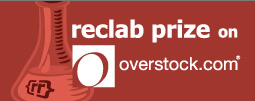 “How do you get people to buy more? That’s the $1 million question — literally.”
“How do you get people to buy more? That’s the $1 million question — literally.”
RichRelevance and Overstock.com have partnered to offer the first-ever RecLab Prize on Overstock.com — up to $1 million in cash to the person or team capable of building the most powerful online product recommendation engine:
The Prize provides a cash award totaling up to $1 million to the researcher or research team who can achieve a measurable lift over existing product recommendations in a wide variety of shopping contexts on Overstock.com. The RecLab Prize rewards the highest performing individual or team based on the results they are able to deliver within a defined judging period (up to $1 million for a 10% or greater lift). (If no one in the round hits this mark, then the judges will award a pro-rated prize to the team who achieves the highest lift as a percentage of the lift they achieve. For example, if the winning team achieves an 8% lift, it will receive $800,000.)
RecLab Prize contestants gain immediate access to a high-quality and comprehensive synthetic dataset via RichRelevance’s open-source RecLab project, a highly scalable platform for research code. The RecLab approach enables researchers to develop their algorithms against synthetic data and then test against real data. Top performing algorithms will be exposed to real data and will run live within the RichRelevance cloud environment (as real product recommendations to Overstock.com’s customers). This groundbreaking approach enables researchers to solve a real-world problem with real-world constraints, while never exposing data to an outside system, thereby preserving data security and eliminating privacy concerns.
“The Netflix Prize did a great job of mobilizing the research community around a new and interesting problem. The RecLab Prize on Overstock.com takes the next step by offering researchers the chance to solve a multi-dimensional, real-world problem and see how their best algorithms perform when put in front of live shoppers,” said Darren Vengroff, RichRelevance Chief Scientist and RecLab creator. “The academic community has been clamoring for access to live real-world data and live user interaction to drive their research, and we are giving them more and better access than ever before using a unique approach that absolutely preserves the privacy of shoppers.”
The competition is targeted toward academia. Should the winning team be affiliated with one or more educational institutions, up to 25% of the prize amount — funded separately from the winning team’s prize — will be allocated to the educational institution(s).
Complete submissions are due by Dec. 1, 2011. Finalists will be announced Feb. 15, 2012, and the winning team will be selected by March 27, 2012.
Peer Review Committee Sought
The organizers are seeking academic and industrial thought leaders who may be able to serve on the RecLab Prize on Overstock.com Peer Review Committee. The committee will be responsible for “selecting the top 10 semi-finalists based on their expert opinions of the expected effectiveness at generating lift and the novelty of design of each of the entries.”
Nominations for the Peer Review Committee are due electronically by June 15.
(Contributed by Erwin Gianchandani, CCC Director)









